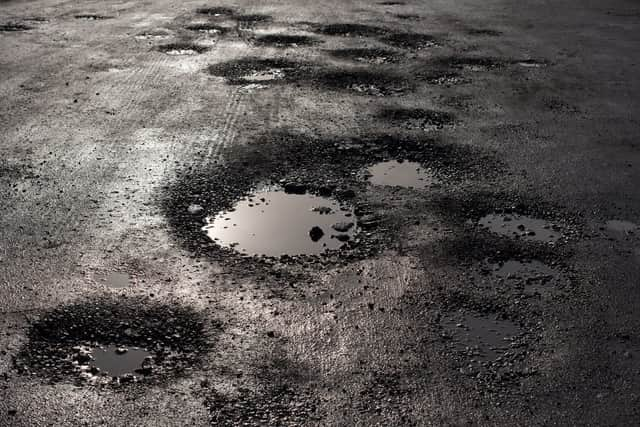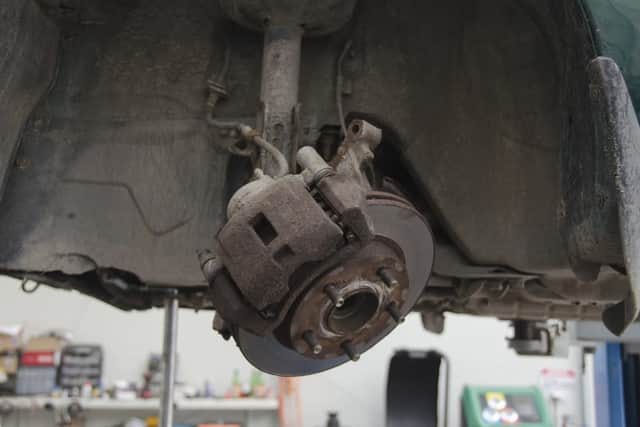UK’s pothole danger zones revealed as 1 in 4 drivers suffers damage


More than a quarter of drivers in the UK say their cars have been damaged by potholes, with millions of people suffering personal injury due to road damage, according to new research.
A poll of drivers found that 27 per cent had needed to have their cars repaired after hitting a pothole but in the worst-hit locations almost half of motorists had suffered damage to their vehicle.
Advertisement
Hide AdAdvertisement
Hide AdTo mark National Pothole Day Select Car Leasing surveyed drivers around the country to determine the scale of the pothole problem and identify the nations’ worst towns and cities for road maintenance.
Gloucester emerged as the country’s pothole capital, with 46 per cent of drivers reporting damage to their cars - significantly more than joint second-place cities Cardiff, Coventry and Plymouth where 38 per cent of drivers experienced problems.
10 Worst cities for pothole damage to cars 2020
1. Gloucester - 45%=2. Cardiff - 38%=2. Coventry - 38%=2. Plymouth - 38%5. London - 33%6. Newcastle - 32%=7. Bristol - 30%=7. Manchester - 30%=7. Edinburgh - 30%10. Aberdeen - 27%
Read more: How to claim for pothole damage
The study also found that six per cent of drivers questioned - equivalent to 2.5 million people - had suffered physical injuries as a result of hitting a pothole.
Edinburgh - seventh on the list for damage - emerged as the location where drivers were most likely to have been hurt by hitting a pothole. A fifth (19 per cent) of those questioned said they had been left in pain, with injuries ranging from bumped heads and bitten tongues to back pain and whiplash. London (15 per cent), Bristol ( nine per cent) and Manchester and Oxford (both seven per cent) were among the other injury hot spots.
Advertisement
Hide AdAdvertisement
Hide Ad10 worst cities for potholde-related injuries 2020
1. Edinburgh - 19%2. London - 15%3. Bristol - 9%=4. Manchester - 7%=4. Oxford - 7%=6. Southampton - 5%=6. Belfast - 5%8. Norwich - 4%=9. Sheffield - 3%=9. Liverpool - 3%
James O’Malley, Select Car Leasing company director, predicted that the pothole problem was only likely to get worse.
He said: “Local authorities are injecting millions into pothole repairs, and also into compensation payouts made to affected motorists. But that investment still isn’t enough to undo the years of underfunding that has led to our road network now resembling Swiss cheese.
“Not everyone reports damage caused by potholes to their council, either because they don’t know how or simply don’t want the hassle. But our stats show just how many people experience it.
“As we continue to experience shocking weather conditions, and with the promise of more snow and ice on the way, it's highly likely road conditions will deteriorate further, prompting even more claims for vehicle damage and personal injury.”
Advertisement
Hide AdAdvertisement
Hide Ad

His prediction was echoed by the RAC, which said the current funding for repairs left councils playing catch-up.
Data from the motoring group showed that despite a drop in traffic levels, potholes accounted for the same proportion of call-outs in 2020 as in previous years. Its pothole index shows that road conditions are slowly improving but drivers are still nearly one and half times more likely to suffer pothole damage now than they were 15 years ago.
RAC head of roads policy Nicholas Lyes said: “We realise council budgets are under incredible pressure due to the coronavirus, but we badly need the Government to recognise the significance of local roads and take a fresh look at how to fund them.
“The Government’s approach of allocating funding to councils from various pots on an annual basis means authorities are always having to play catch-up by fixing potholes rather than focusing on preventative maintenance. We would prefer to see them make five-year funding settlements which would allow councils to make longer-term plans for their roads.
Advertisement
Hide AdAdvertisement
Hide Ad“Putting aside 2p from the existing 58p a litre duty on the sale of petrol and diesel would generate nearly £5 billion of additional funds for local roads over five years. This would surely help to bring our local roads back to a fit-for-purpose state.”
How to avoid pothole damage
The most obvious way to avoid damage to your car is to avoid potholes but that’s not always as easy as it sounds.
If you can’t avoid a pothole, Mr O’Malley has the following advice for improving your chances of avoiding damage.
“Properly inflated tyres – not too soft, not too hard – is one of the best ways to limit pothole damage.”
Advertisement
Hide AdAdvertisement
Hide AdOver-inflated tyres can transfer more of the impact to suspension components while under-inflated ones are at risk of bursting or allowing damage to wheels.
“In winter we should all be keeping a really close eye on our tyre pressures and checking them at least once a week. In cold weather, your tyre pressure drops as the air inside contracts and shrinks. If a tyre is inflated to 29PSI at 20C, it might only read 26PSI at 0C."
